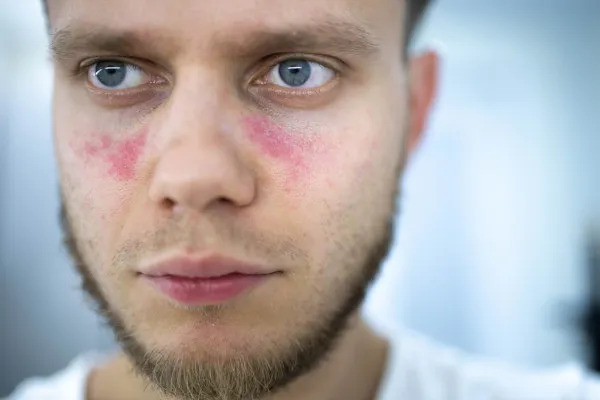O world lupus day It's this Wednesday, May 10th. The date aims to share information about the disease in order to promote debate on the importance of diagnosis, treatment and improvement in health services.
O lupus or systemic lupus erythematosus (SLE) is autoimmune inflammatory disease in which the immune system attacks healthy tissues in the human body.
The condition can affect different organs and tissues, such as the skin, joints, kidneys and brain.
Since 2004, actions to raise awareness about the disease have been carried out on World Lupus Day. At an international level, the World Lupus Federation is the organization that brings together institutions from several countries to promote the campaign.
know more: How our immune system works
What is lupus?
Lupus or systemic lupus erythematosus (SLE) is a "chronic disease of autoimmune origin in which the immune system begins to produce substances and antibodies that mistakenly lead to inflammation of the body's healthy tissues," explains rheumatologist Edgard Reis from Hospital Alemão Oswaldo Cross.
Edgard explains that normally the body produces antibodies to guarantee protection against infections caused by viruses, fungi and bacteria. In cases of autoimmune diseases such as lupus, these antibodies attack certain cells and organs in the body.
To the causes of lupus are still unknown, scores the rheumatologist. What is known is that hormonal, genetic and environmental factors are present in the development of the disease.
See in the video below the explanation of the doctor Edgard Reis about the disease diagnosis:
People who have a genetic susceptibility to develop lupus may face exposure to factors environmental factors such as solar radiation, viral infections or by other micro-organisms, present alterations immunological.
According to Edgard, when the immune system starts to act in a deregulated way, the so-called "immunoderegulation, in which there is the production of antibodies against structures and cells of the body" causing inflammation of these sites.
It is a disease that presents worsening cycles, known as "disease activity", as well as periods of improvement, called "remission". The condition can affect various organs and tissues of the body, such as: skin, joints, kidneys, lungs, heart, blood cells, brain and others, Edgard lists.
Check also:The causes, types and treatment of cancer
Why is lupus more common in women?
Lupus is more common in women, probably, due to the action of estrogen, female hormone that has higher levels in the period between the first menstruation and menopause, explains Edgard Reis.
It is important to point out that estrogen alone is not enough to cause lupus. The disease, reminds Reis, can be caused by a combination of genetic, hormonal and environmental factors.
Check out some information highlighted by the rheumatologist Edgard about the age groups and gender related to lupus:
More common in women (15 to 45 years old). In this case, the ratio is 9 to 14 women for each man, representing 70% of cases.
Rarer before the age of 16, a condition that is called juvenile onset lupus (20% of cases), in the proportion of 3 women for each man.
After the age of 50 it is called late onset lupus (3 to 20% of cases), it occurs in 3 to 8 women for every man.
prevention of lupus
"There is no specific prevention for the onset of lupus", emphasizes Edgard.
It is essential to maintain healthy habits combined with follow-up with a rheumatologist to ensure proper control of lupus, as it is a chronic disease.
lupus symptoms
Lupus symptoms can change depending on which parts of the body are affected by the disease.

Credit: Shutterstock.
Know the lupus symptoms, according to the Ministry of Health:
Fatigue;
Fever;
Joint pain;
Muscle stiffness and swelling;
Skin rash - redness on the face in the form of a "butterfly" over the cheeks and the tip of the nose. It affects about half of people with lupus. The rash is worse in sunlight and may also be generalized;
Skin lesions that appear or worsen when exposed to the sun;
Difficulty breathing;
Chest pain when inhaling deeply;
Sensitivity to sunlight;
Headache, mental confusion and memory loss;
Enlarged lymph nodes;
Loss of hair;
Mouth sores;
General discomfort, anxiety, malaise.
See too:Skin Cancer - What it is, symptoms, treatment and prevention
types of lupus
Check out the types of lupus, according to the Ministry of Health:

Information from the Ministry of Health.
lupus treatment
Lupus treatment begins with a "good information for the patient about the disease, as this makes him the protagonist and main actor during the treatment journey", says Edgard.
"Understanding the disease, making the correct use of medications and having periodic medical consultations clarifying your doubts about the disease are very important for everything to go well. It is also very important to encourage healthy lifestyle habits, such as physical exercise, proper diet, avoiding smoking and treating other diseases. that may be present (hypertension, diabetes, changes in cholesterol, thyroid, etc.), as well as an updated vaccination record according to guidance doctor."
Edgard Reis - Rheumatologist
It is important that during treatment the patient avoids exposure to sunlight and ultraviolet radiation without adequate protection. "The sun's rays of the UVA and UVB type can cause lupus activity, not only in the skin and other organs. The use of sunscreen is a great ally in the treatment of the disease and should be applied in areas exposed to the sun", explains Edgard.
The prescription of medications should always be made by a specialist doctor. The choice and dose of immunosuppressants and other drugs used is carried out according to the degree of severity of the disease, drug availability and patient preference.
Do not stop now... There's more after the publicity ;)
lupus care
People living with lupus should take some health care in addition to following the treatment:
Avoid exposure to sunlight and ultraviolet radiation without adequate protection;
Maintain a healthy diet and adequate body weight;
Perform regular physical exercise practices.
Keep medical follow-up on a periodic basis, always following the guidelines and tests requested.
As for the sun protection for people with lupus, Edgard makes some recommendations:
Regular use of sunscreen, especially between 9 am and 4 pm;
Use at least factor 30 sunscreen, with frequent reapplication, ideally every 2 to 3 hours;
Use of appropriate clothing for sun protection, even on cloudy days;
Pay attention to protecting the parts of the body that are most exposed: face, neck, arms and legs.
By Lucas Afonso
Journalist

